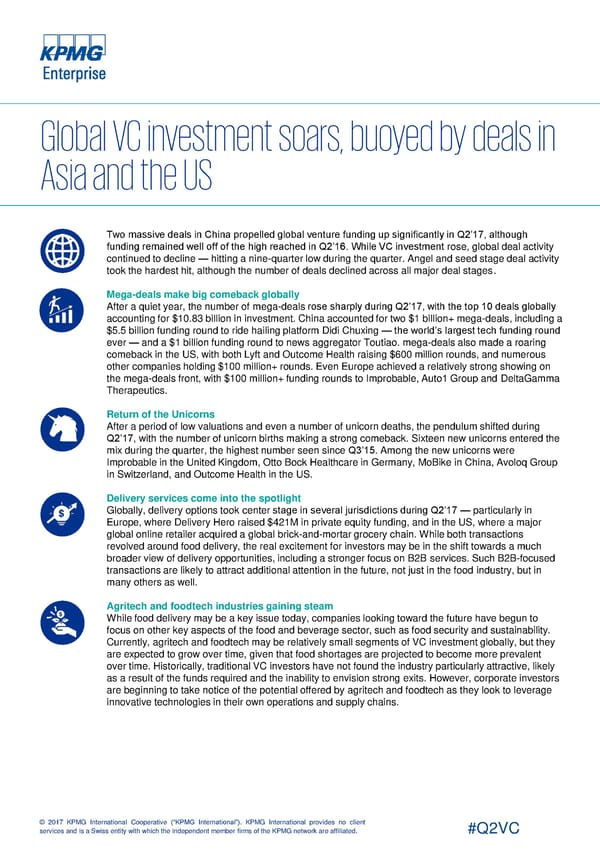Two massive deals in China propelled global venture funding up significantly in Q2’17, although funding remained well off of the high reached in Q2’16. While VC investment rose, global deal activity continued to decline — hitting a nine-quarter low during the quarter. Angel and seed stage deal activity took the hardest hit, although the number of deals declined across all major deal stages. Mega-deals make big comeback globally After a quiet year, the number of mega-deals rose sharply during Q2’17, with the top 10 deals globally accounting for $10.83 billion in investment. China accounted for two $1 billion+ mega-deals, including a $5.5 billion funding round to ride hailing platform Didi Chuxing — the world’s largest tech funding round ever —and a $1 billion funding round to news aggregator Toutiao. mega-deals also made a roaring comeback in the US, with both Lyft and Outcome Health raising $600 million rounds, and numerous other companies holding $100 million+ rounds. Even Europe achieved a relatively strong showing on the mega-deals front, with $100 million+ funding rounds to Improbable, Auto1 Group and DeltaGamma Therapeutics. Return of the Unicorns After a period of low valuations and even a number of unicorn deaths, the pendulum shifted during Q2’17, with the number of unicorn births making a strong comeback. Sixteen new unicorns entered the mix during the quarter, the highest number seen since Q3’15. Among the new unicorns were Improbable in the United Kingdom, Otto Bock Healthcare in Germany, MoBike in China, Avoloq Group in Switzerland, and Outcome Health in the US. Delivery services come into the spotlight Globally, delivery options took center stage in several jurisdictions during Q2’17 — particularly in Europe, where Delivery Hero raised $421M in private equity funding, and in the US, where a major global online retailer acquired a global brick-and-mortar grocery chain. While both transactions revolved around food delivery, the real excitement for investors may be in the shift towards a much broader view of delivery opportunities, including a stronger focus on B2B services. Such B2B-focused transactions are likely to attract additional attention in the future, not just in the food industry, but in many others as well. Agritech and foodtech industries gaining steam While food delivery may be a key issue today, companies looking toward the future have begun to focus on other key aspects of the food and beverage sector, such as food security and sustainability. Currently, agritech and foodtech may be relatively small segments of VC investment globally, but they are expected to grow over time, given that food shortages are projected to become more prevalent over time. Historically, traditional VC investors have not found the industry particularly attractive, likely as a result of the funds required and the inability to envision strong exits. However, corporate investors are beginning to take notice of the potential offered by agritech and foodtech as they look to leverage innovative technologies in their own operations and supply chains. © 2017 KPMG International Cooperative (“KPMG International”). KPMG International provides no client services and is a Swiss entity with which the independent member firms of the KPMG network are affiliated. #Q2VC
 Global Page 1 Page 3
Global Page 1 Page 3